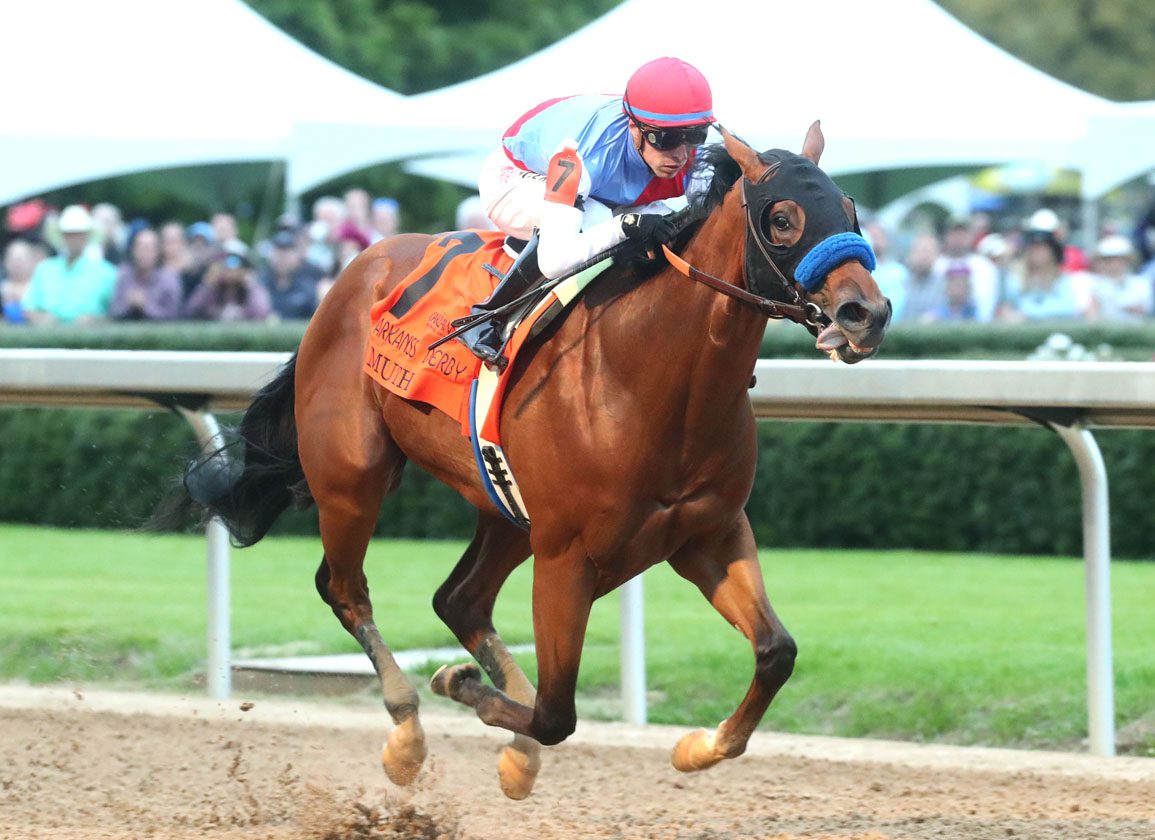By T. D. Thornton
The Kentucky judge overseeing the lawsuit initiated by Amr Zedan's incorporated racing stable against Churchill Downs, Inc. (CDI) to try and get Bob Baffert-trained horses unbarred from the GI Kentucky Derby told both parties Wednesday he now has a clearer understanding of a relatively new “meritless lawsuit” law to be able to issue a written opinion by the end of the week.
That opinion is unlikely to decide the Apr. 3 civil lawsuit in full, but it is expected to address Zedan's motion for an injunction that could pave the way for his 'TDN Rising Star' Muth (Good Magic) to be able to race in the Derby. It could also address CDI's motion to dismiss.
CDI has banished Baffert from its properties since just after the 2021 Derby, which the now-disqualified Zedan-owned and Baffert-trained Medina Spirit won while testing positive for betamethasone.
The ban was initially just supposed to last for two Derbies. But in July 2023 CDI extended the penalty through 2024.
Zedan is claiming that he spent millions in buying horses at auction prior to the extension of the ban because he understood that Baffert would be allowed to train those horses for the 150th Derby in 2024.
Judge Mitchell Perry of Jefferson Circuit Court needed only a bit more than 20 minutes of testimony from all parties Apr. 17 to declare that he now had a better idea of how CDI's invocation of an “Anti-SLAPP” law (Strategic Lawsuits Against Public Participation)–which carries an automatic pause in some related legal proceedings–might affect his forthcoming written opinion.
“Obviously, I deal with injunctions all the time in various [contexts],” Perry said. “So that part is obviously well known to the court. This new statute is not.”
CDI on Apr. 8 moved to dismiss Zedan's lawsuit, citing, in part, that the complaint runs contrary to Kentucky's Anti-SLAPP law that provides protections in certain cases based on a person's exercise of speech.
In April 2022, Kentucky became the second state to enact a version of the Uniform Public Expression Protection Act (UPEPA), a model anti-SLAPP law drafted by the Uniform Law Commission.
In arguing against the application of that statute, Zedan had articulated concerns that CDI's legal invocation of UPEPA/Anti-SLAPP was “not only meritless, but perverse.”
More importantly, in terms of timing, an Anti-SLAPP claim, if allowed to proceed by a judge, would take at least 30 days, if not several months, to legally unfold.
At a previous hearing on Monday, no one seemed to know for sure if that law's invocation, if allowed by Perry, would mean a mandatory halting of all other legal proceedings, including Zedan's pending motion for the temporary injunction. Thus, Perry asked for representatives of the Kentucky State Attorney General to appear in court Apr. 17 with their interpretation.
At Wednesday's hearing, Lindsey Keiser, a Kentucky assistant attorney general, told the judge that under a subsection of the state's law, “UPEPA does not cut off judicial decisions or judicial discretions with respect to motions seeking a temporary injunction.”
Keiser continued: “Our interpretation is that under [a subsection of the law] you could proceed simultaneously [with deciding on CDI's motion invoking UPEPA and Zedan's injunction request]. Officially there's no stay with respect to a temporary injunction motion.”
Derek Shaffer, an attorney for Zedan, urged the judge to use that explanation from the attorney general's office to go ahead and rule on the temporary injunction. Horses declared for the Derby need to be on the grounds at Churchill by Apr. 27.
Regardless of larger questions concerning the UPEPA claim and the underlying lawsuit itself, “you ought to be resolving the temporary injunction motion on merits,” Shaffer said.
Thomas Dupree, Jr., an attorney for CDI, wanted to make it clear that the injunction relief sought by Zedan wasn't being requested to preserve well-documented rules established by CDI regarding the Derby, but rather, to upend them.
“I did want to underscore the nature of the temporary injunction they're seeking here is, of course, not a 'status quo' injunction,” Dupree said. “It is an injunction that would affirmatively disrupt the status quo substantially.”
Although it was not spoken of during Wednesday's hearing, a ruling allowing Muth into the race would have myriad downstream implications. It is unknown if an injunction in favor of Zedan would allow other Baffert trainees owned by different entities to also participate in the Derby, or if any lifting of the ban would also permit Baffert's trainees to enter the GI Kentucky Oaks or any other Derby undercard stakes.
The Kentucky news website WAVE3 reported on Tuesday that one of the partners who co-owns the Baffert-trained Imagination (Into Mischief) had filed an amicus brief with the court seeking similar eligibility-via-injunction for that colt, who on Apr. 6 ran second in the GI Santa Anita Derby.
Also unclear is what such a ruling would mean for Derby aspirants owned by other connections, specifically already-qualified horses that might get knocked below the points cutoff limit that CDI has been using to determine Derby eligibility if Muth (and potentially other Baffert trainees) are suddenly ordered into the race by the injunction.
CDI generally takes entries for 24 horses in the Derby, with 20 being allowed to start.
Perry said there would be no press conference or media announcement pertaining to his ruling, which would be delivered in the form of an opinion posted electronically to the court's filing system.
“And you'll know sometime before the end of the week,” Perry said.
Not a subscriber? Click here to sign up for the daily PDF or alerts.






